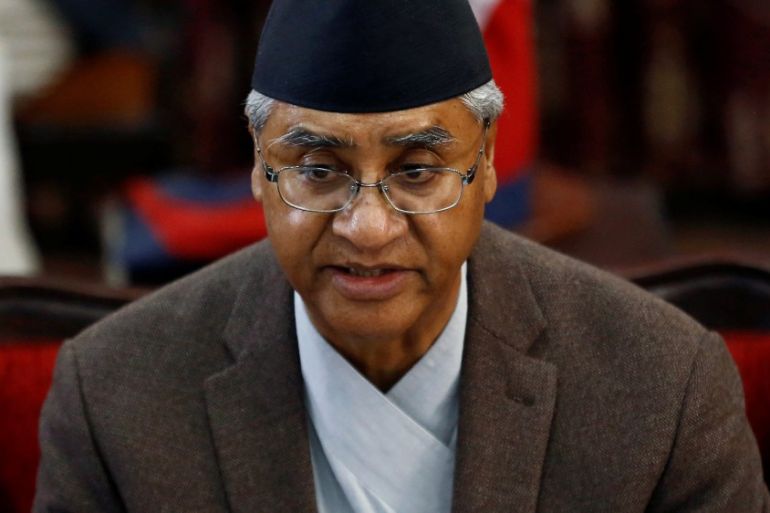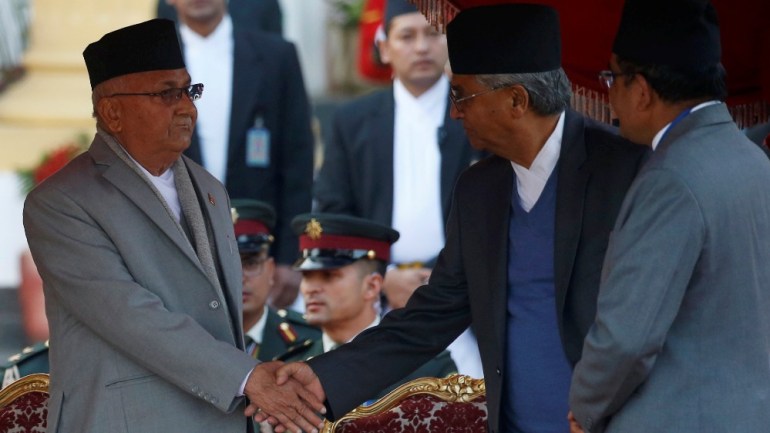Sher Bahadur Deuba: Veteran Nepali politician sworn in as PM
Sher Bahadur Deuba, who leads the Nepali Congress party, takes over as prime minister after top court reinstated parliament.

Nepal’s main opposition leader Sher Bahadur Deuba was sworn in as prime minister on Tuesday a day after the country’s highest court ousted his predecessor following months of political turmoil.
Deuba, 74, takes prime minister’s post for the fifth time, a day after the Supreme Court reinstated the parliament dissolved by caretaker Prime Minister KP Sharma Oli in May.
Keep reading
list of 4 itemsNepal plunges into crisis – again. Here’s what you need to know
‘Fear and panic’ as COVID ravages Nepali villages near Mt Everest
Nepal’s Supreme Court reinstates dissolved parliament
“I, in the name of God, the country and people, pledge that I will be committed and honest to the nation and its people to fulfil my duty as prime minister,” Deuba said as officials looked on.
Deuba, the head of the opposition Nepali Congress, had claimed to have the support of 149 members of the 275-seat lower house.
The 74-year-old leader has to win a vote of confidence in the lower house within a month to retain the prime ministership. The Supreme Court said the lawmakers must meet within seven days.
Oli, who came into power in 2018, was removed as prime minister by the Supreme Court on Monday after it rejected his latest effort to dissolve the bicameral parliament. The 69-year-old first tried to dissolve parliament in December, but that attempt was also overturned by the court.
Earlier on Tuesday, President Bidya Devi Bhandari appointed Deuba as the new prime minister at the order of the court.
Deuba will lead the Himalayan nation as it struggles with political divisions and the coronavirus.
The Nepali Congress leader was previously appointed prime minister in 1995, 2001, 2004 and 2017, but has never served a full term. This time as well, he is to serve only until parliamentary elections are held by 2022.

The current chamber was elected in 2008 after the end of a bloody Maoist rebellion and the abolition of Nepal’s 200-year-old monarchy.
Bring Nepal back closer to India
Deuba is likely to bring Nepal back closer to India after Oli favoured ties with its other giant neighbour, China.
He has been active in politics since he was a college student. He was jailed for nine years for protesting against the now-deposed monarchy’s autocratic rule. He has led Nepali Congress, the country’s oldest political party, for years.
In a televised speech, Oli criticised the Supreme Court decision but said he would leave office.
Oli’s decision to dissolve the House in May was challenged in the Supreme Court by a coalition of opposition parties that said they had the support of a majority in parliament to form a new government. His decision to dissolve the House in December was also reversed by the court in February.
Oli became prime minister in 2018 after his Nepal Communist Party (NCP) won a majority of the seats in the House of Representatives. The NCP was formed in 2018 through a merger between the Communist Party of Nepal – Unified Marxist Leninist (CPN-UML) and the Communist Party of Nepal (Maoist Centre).
However, he refused to honour an agreement to hand over power to the party’s co-leader after half his term, leading to political splits and weakening Oli’s hold on power. Oli has also been criticised for his handling of the coronavirus pandemic.
The court in February also deregistered the ruling NCP over a separate petition, reviving the CPN-UML and the CPN (Maoist Centre).